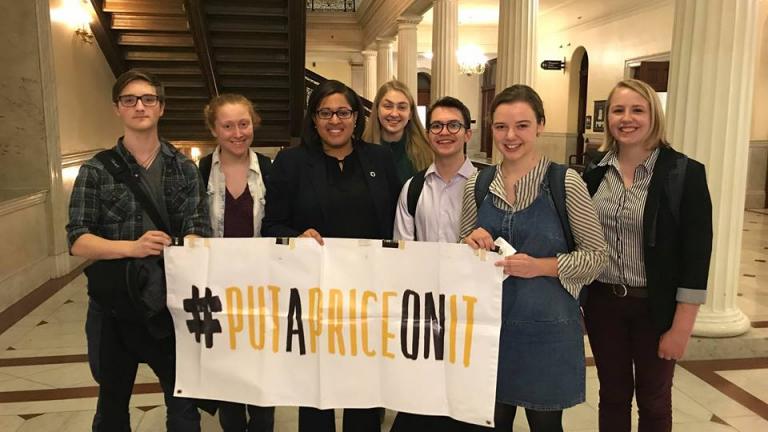
How can we empower millennials to hold polluters accountable?
Our Climate is spearheading the “Put a Price On It” campaign to educate and embolden students to put an end to carbon pollution through carbon pricing initiatives. Our Climate is in a unique position to do so – it’s run by millennials for millennials. The average age of their staff is 24.

Our Climate’s goals are to facilitate carbon pricing campaigns, mobilize a diverse base of youth interested in climate justice, and utilize art and media for environmental causes. They started small in Oregon, meeting with legislators and grassroots organizing. When National Geographic’s Years of Living Dangerously learned about their work and sent a film crew to document Our Climate activism, they gained attention at the national level. After being featured, executive director Page Atcheson states, “we had this realization that our work – empowering young people to advocate for bold climate policy – was unique and increasingly urgent.” Our Climate proceeded to develop curriculum and do outreach work that could expand beyond Oregon.
One program of “Put a Price On It” is leadership training for students interested in carbon pricing. Students from 80 different campuses in 18 different states have participated in this training, and used it in both on-campus and state initiatives. Our Climate’s focus on youth is deliberate: young people sense the urgency of climate change, and have the potential and energy to combat it. Our Climate encourages creative climate action, such as activist art and community-based strategies to engage youth and address climate change in a multi-disciplinary way. Through Our Climate, students can become Climate Fellows, field representatives, or join the action team and advocate for carbon pricing in their state of residence.
Through this approach, Our Climate has secured 40 endorsements from college and university presidents for carbon pricing, facilitated hundreds of conversations with legislators, and convened 180 local and state organizations to join in on the “Put a Price on it” campaign. Our Climate’s reach on social media is also notable; #PutAPriceOnIt videos have aggregated 3 million views and allowed carbon pricing programming to reach a wide audience. They are excited by the Climate CoLab win, stating: “Our Climate is still a relatively young organization, but our lofty and ambitious goals require that we break through political inertia and develop high-level partnerships. Momentum for carbon pricing is growing fast, and our young leaders have been buoyed by Climate CoLab’s recognition.”

Atcheson highlights Our Climate’s goals as adding teeth to the “Still In” movement, providing proof that states can leverage against federal inaction, providing broad support for climate action, and facilitating civic participation. Atcheson states: “We are increasingly reminded that climate change is an urgent, very real threat to our generation. The ‘Put A Price On It’ campaign is a vehicle for young people to engage in the democratic process, calling on lawmakers to support bold solutions that will mitigate the worst effects of climate change. We are so grateful to the MIT Climate CoLab community for recognizing this work and look forward to future collaboration.”






